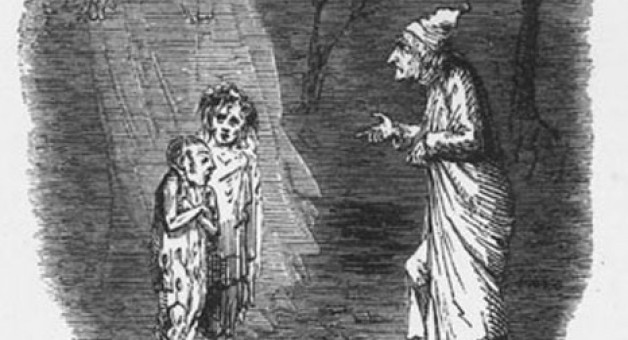For millions of Americans, watching one of the many film adaptations made over the years of Dickens’s classic, A Christmas Carol, is an annual tradition. (I’m not ashamed to say my favorite is The Muppet Christmas Carol.) In all of these, Ebenezer Scrooge is transformed from an unfeeling miser to a warm, charitable man through the appearance of four ghosts on the night before Christmas.
At the beginning of the book, when he is confronted by men taking up a charitable collection for the poor, Scrooge holds back. “If they would rather die,” he says, “they had better do it, and decrease the surplus population.”
It is the prophesied death of Tiny Tim, the son of Scrooge’s clerk, Bob Cratchit, that confronts Scrooge with the reality of his wish. “Scrooge hung his head to hear his own words quoted by the Spirit, and was overcome with penitence and grief.” The “surplus population” is no longer a nameless, faceless mass, but real human beings with lives and families.
Scrooge’s position may seem like a caricature designed to illustrate the moral of the story, but throughout the last three centuries this type of thinking—“Eliminate Poverty by Eliminating the Poor”—has been deadly serious. Even in our own time it is pervasive.
Steven D. Levitt and Stephen J. Dubner’s 2005 book, Freakonomics, argues that the drop in crimes rates during the 1990s was the result of legalized abortion. According to these researchers, legal abortion meant that criminals who otherwise would have been born, weren’t.
Last summer, Melinda Gates, the wife of billionaire Microsoft founder Bill Gates and a Catholic, stirred up controversy by starting a contraception program for women in developing countries. According to a CNN interview, she sees the effort as part of being “an advocate for poor women.”
Ironically, she says, “Part of what I do with the [Gates] Foundation comes from that incredible social justice I had growing up and the belief that all lives, all lives are of equal value.” All lives are of equal value—but it is better for the poor not to be born.
What does Jesus mean when he says in John 12:8, “The poor you always have with you, but you do not always have me”? Does this imply that we should stop working toward the eradication of poverty, since it is hopeless?
No, of course not. Jesus is referencing Deuteronomy 15:11: “The land will never lack for needy persons; that is why I command you: ‘Open your hand freely to your poor and to your needy kin in your land.'” In his Law, God provides for the care of the needy in Israel. Just a few verses earlier, Deuteronomy 15:4 declares, “There shall be no one of you in need.”
The needs of God’s people must be met by God’s people. In charity, we can and must care for the poor. Although Christ in John 12:18 puts worship ahead of concern for the poor, the Gospels make it abundantly clear that our treatment of the poor and the weak will determine how we are judged. In Matthew 25:31–46, for example, Jesus sets our treatment of the least as a standard. “Amen, I say to you, whatever you did for one of these least brothers of mine, you did for me.”
Concern for the poor does not involve an assault on fertility. Instead, it should involve giving from the heart—providing food, clean water, and helping to promote positive economic growth. Maybe we can all learn, with Mr. Scrooge, that in sharing our abundance we can also spread good cheer, both inside and outside the Christmas season.
✠
Image: John Leech, Ignorance and Want (1843)







